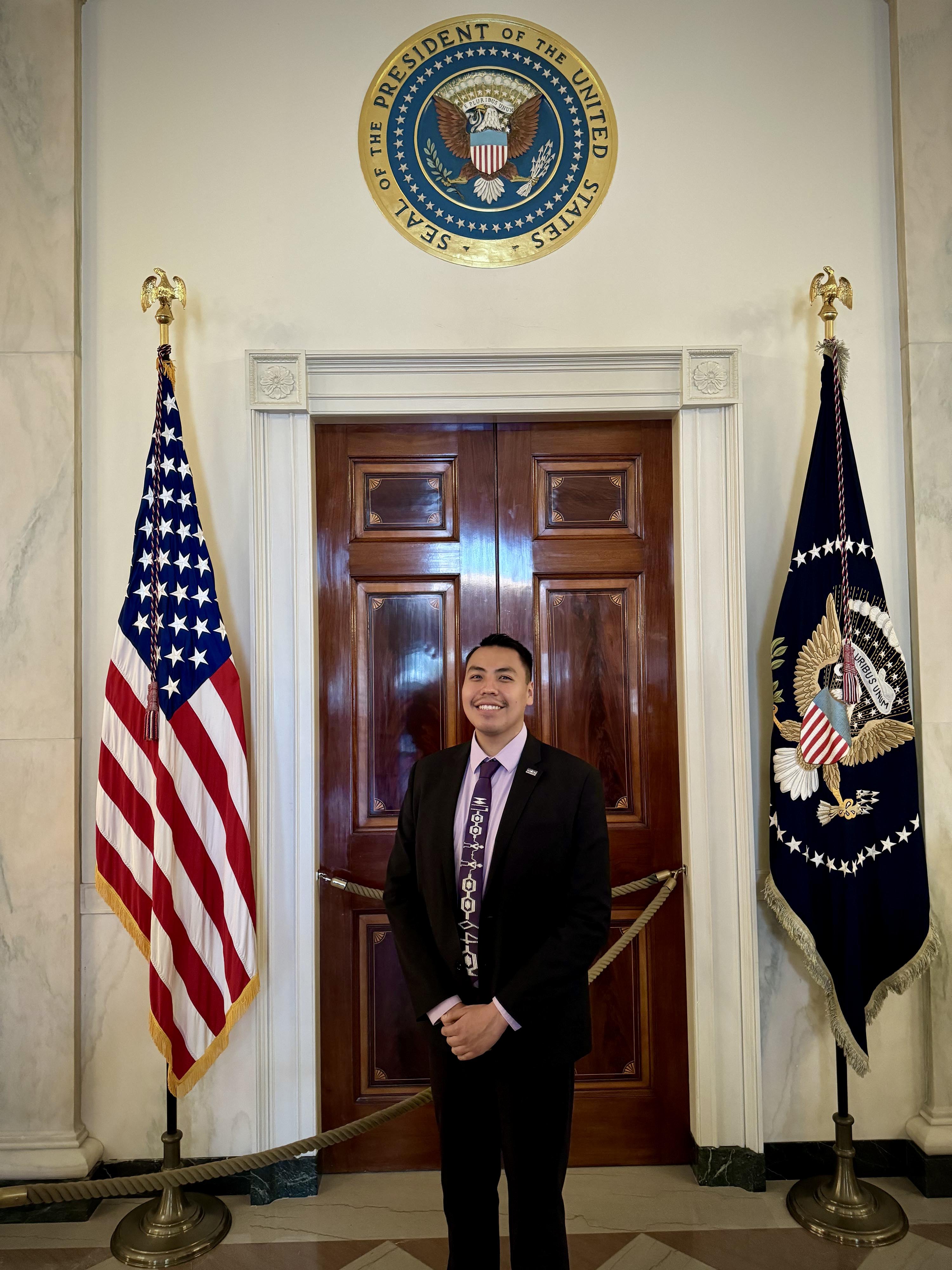Rory Wheeler is a third-year student in the MSU College of Law.
As a proud citizen of the Seneca Nation, Turtle Clan and a descendant of multiple tribes, including the Mandan, Hidatsa, Arikara Nation, Cayuga Nation, Standing Rock Sioux Tribe, and the Confederated Tribes of the Umatilla Indian Reservation, my identity is deeply intertwined with the history and culture of Indigenous peoples. Growing up on the Seneca Nation Cattaraugus Territory near Buffalo, New York, I was raised with the teachings of our elders, who emphasized the importance of language, culture, and community service. These teachings instilled in me a profound sense of responsibility to honor the seven generations that came before me and to protect the well-being of the seven generations to come. My journey into advocacy began at a young age, driven by a passion for uplifting underserved communities and enhancing the well-being of Indigenous Nations.
At just 15 years old, I embarked on my journey as an advocate for tribal issues, interning in the Seneca Nation government. This experience opened my eyes to the intricacies of tribal governance and the critical issues facing our communities. My dedication to advocacy was further solidified when I was selected as a White House Tribal Nations Youth Ambassador under President Barack Obama. This role allowed me to represent Native youth at the national level, collaborating with the National Congress of American Indians and gaining invaluable experience in tribal policy.
Today, as a law student at Michigan State University College of Law, I feel incredibly blessed to be part of an institution that prioritizes the education of future advocates for Indigenous rights. The opportunity to learn from esteemed faculty members, such as Professors Wenona Singel, Kate Fort and Zeke Fletcher, has broadened my understanding of federal Indian and Tribal law. Their mentorship has been instrumental in equipping me with the tools necessary to address the complex legal challenges that Indigenous communities face.
MSU Law has not only provided me with a solid foundation in legal education but has also fostered a community of passionate advocates. The Indigenous Law and Policy program has produced numerous alumni who are making significant contributions to tribal governance and advocacy, inspiring me to continue on this path. My recent trip to the Blackfeet Nation with the Indian Law Clinic was a transformative experience that further reinforced my commitment to tribal empowerment. We served as law clerks to the Blackfeet Nation Court of Appeals, assisting with legal research and writing. This engagement taught me about the unique sovereignty challenges faced by the Blackfeet people and the importance of collaboration in fostering community empowerment.
The most rewarding aspect of my work with tribes is witnessing the tangible impact we can achieve together. Whether through legal advocacy, youth leadership development, or community engagement, seeing our people uplifted and empowered fuels my passion for this work. Each opportunity to meet with tribes across the country, from Washington to Louisiana, has deepened my appreciation for the resilience and diversity within Indigenous communities.
The decision to pursue a legal degree was not one I took lightly. During the summer before my senior year of high school, while interning in the office of the Seneca Nation President, I received invaluable advice from the President’s legal counsel, Martin E. Seneca, Jr. He encouraged me to consider a legal education focused on Native American law, a suggestion that initially felt daunting, as there were no lawyers in my family. However, his belief in my potential ignited a desire within me to amplify the voices of our people through the legal system.
My undergraduate experience at Niagara University further solidified my commitment to this path. I engaged in Native American advocacy and policy roles in Washington, D.C., working alongside seasoned practitioners who inspired me to pursue law school. With the guidance of mentors like Professor Kevin Hinkley, I applied to MSU Law and participated in the Native American Pathway to Law Program, where I discovered a community of like-minded individuals dedicated to advocating for Indigenous rights.
After earning my Juris Doctor, my aspirations include continuing to work in federal Indian and tribal law, with a focus on advancing tribal sovereignty, environmental rights, and public service. My ultimate goal is to create legal frameworks that empower tribes to navigate contemporary challenges while honoring our traditions and cultures. My time at MSU Law has emboldened me to pursue this path, reinforcing my belief that public service is a noble calling.
For those considering a legal degree, I encourage you to prioritize time management and set clear goals. Engage in activities that resonate with your passions and seek support from peers and mentors. Balancing academics and extracurriculars can be challenging, but finding this balance is essential for personal and professional growth.
My journey has been shaped by a commitment to serve my community and advocate for Indigenous rights. Through my education at MSU Law, the mentorship of remarkable faculty, and the inspiration from fellow advocates, I am more determined than ever to make a meaningful impact. As I continue my journey in law, I carry with me the teachings of my elders and the unwavering spirit of my ancestors, striving to uplift my community and ensure that the voices of Indigenous peoples are heard and respected for generations to come.
